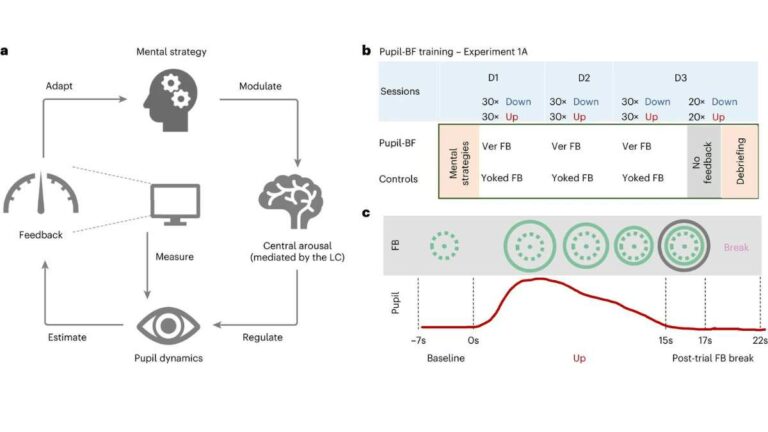Even a 1% reduction in deep sleep per year for people over 60 years old translates into a 27% increased risk of dementia, according to a new study. The finding suggests that enhancing or maintaining deep sleep, also known as slow wave sleep, in older years could stave off dementia. The study, led by Associate…
Bad Grammar Can Stress You Out Physically
A new study led by University of Birmingham professors has revealed for the first time how our bodies go into stress mode when we hear incorrect grammar. Professors Dagmar Divjak, Professorial Research Fellow in Cognitive Linguistics and Language Cognition at the University of Birmingham, and Petar Milin, Professor of Psychology of Language and Language Learning,…
Pupil-based Biofeedback Helps Lessen Anxiety and Stress
Our pupils reflect our level of arousal: they dilate when we are tense, stressed, or even panicked, and constrict when we relax. A nucleus in the pons of the brainstem known as locus coeruleus, which measures roughly 15 millimeters, is crucial to this. It governs our level of arousal via the neurotransmitter noradrenaline and is…
How People Aren’t as Self-centered as You Might Think
If you’ve read much about psychology or evolution, it’s easy to get the idea that humans are hardwired to act as if the world revolves around themselves. But my team’s new study joins a growing body of research showing that humans are highly attuned to other people and what they think. Indeed, our findings suggest…
Anger Can be Beneficial for Achieving Challenging Goals
Anger, which is frequently associated with negative emotions, can, according to new research, serve as a potent incentive for individuals to accomplish difficult life goals. “People often believe that a state of happiness is ideal, and the majority of people consider the pursuit of happiness a major life goal,” said lead author Heather Lench, Ph.D.,…
SARS-CoV-2 Virus Spreads Within Neurons
A new study confirms that SARS-CoV-2 is capable of infecting human neurons in vitro and migrating into axons, the nerve cell projections that carry information. The emergence of many SARS-CoV-2 mutations has resulted in a wide range of clinical profiles and symptoms in patients. For the first time, scientists at the Institut Pasteur and Université…
Urban Life Linked with Higher Depression Rates In Developed Countries
The United Nations predicted in 2018 that 68 percent of the world’s population would live in urban areas by 2050, up from 55 percent in the present. This is a cause for concern among researchers because urban living is associated with a number of risk factors for mental illness. One 2019 meta-analysis compared depression rates…
How Grown-ups Decode What Babies are Saying
When babies first begin to talk, their vocabulary is very limited. Often one of the first sounds they generate is “da,” which may refer to dad, a dog, a dot, or nothing at all. How does an adult listener make sense of this limited verbal repertoire? A new study from MIT and Harvard University researchers…
Curiosity Can Make You More Patient For Answers
In a new study, neuroscientists at Duke University found that people who are curious paradoxically become more patient in waiting for an answer while also becoming more eager to hear it. By outlining a facet of curiosity that motivates us to remain involved rather than look for quick relief, the research may be beneficial to…








